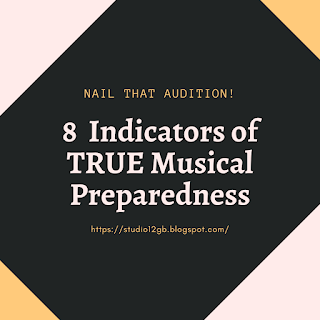The 8 Indicators of TRUE Musical Preparedness
I was talking with a colleague recently about our dismay with the lack of preparation we were witnessing in our high school students for high stakes auditions (i.e. college, tours, equity). Without proper guidance or practice auditioning, it's difficult to expect these kids to know what a TRULY prepared audition looks like.
Though we were mainly conversing about high stakes auditions, this degree of preparation can also apply to amateur and community settings.
So, here's a beginning, but certainly not exhaustive, list:
1. You know your pitches and rhythms. This is what you should know MINIMALLY. Heck, I don't allow most of my students to workshop a piece at this level of preparedness... because it's the bottom of the pyramid.
2. You have highlighted/circled important metrical markings (i.e. ritardando, rallentando, a tempo) AND have based your initial tempo off of many different performances of the song (and you have confirmed the tempo with a metronome). Which means you've....
3. Listened to MANY interpretations of the piece. BONUS points if you did not sing along with it and just listened to the choices the singers were making and investigated HOW they made those sounds.
4. You know what the orchestra and/or piano part sounds like independently of your own part. You are part of a whole and knowing how you fit in is essential to good music making.
5. You've marked in RED pen where you intend to start your audition cut and where you intend to end. You've written the metronomical marking (i.e. quarter note equals 97) for every major metrical change. You've written in additional text that is important to the pianist, like colla voce (this means to follow the singer because the tempo is free).
6. You know what you are singing about INSIDE OUT. You know the ENTIRE show, not just the song. You've actually read the script, not a Wikipedia analysis, and have done a formal, written character analysis of your character in the piece.
7. You are able to be flexible as each pianist is different. You are not rigidly stuck in one interpretation of your piece vocally, physically, or emotionally. You have at least 5 different interpretations of that piece, ready to go.
8. Every gesture you make has meaning and forward motion. Your repertoire includes more than T-rex arms.
Proper preparation is research-intensive. Proper preparation is self-reflection intensive. Proper preparation consists of making sound choices based on your research and self-reflection.



Comments
Post a Comment